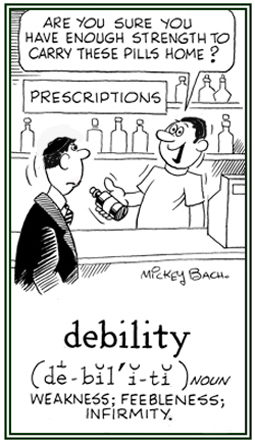de-
(Latin: from, away from, off; down; wholly, entirely, utterly, complete; reverse the action of, undo; the negation or reversal of the notion expressed in the primary or root word)
debilitating (adjective), more debilitating, most debilitating
Pertaining to the reduction of someone's strength or energy: Joyce had a debilitating week at work because her colleague was on vacation and so she had to complete the assignments for two people instead of the normal responsibilities.
A process of being weakened, exhausted, or deprived of strength: As a result of her long illness, Jan is living in a state of debilitation and is being treated in a rehabilitation clinic in an effort to get her strength back to normal.
1. A general lack of strength and energy: After having a restless night and not being able to get enough sleep, Jim was in a state of debility in the morning and had to force himself to go to work.
2. Etymology: from Latin deilidas, derived from the adjective debilis, "weak" from a compound formed from the prefix de-, "from, away, not" + -bilis, "strength".

© ALL rights are reserved.
Go to this Word A Day Revisited Index
2. Etymology: from Latin deilidas, derived from the adjective debilis, "weak" from a compound formed from the prefix de-, "from, away, not" + -bilis, "strength".
Although there seems to be a similarity with debility and ability, they are not related to each other nor do they have any common meanings.

Go to this Word A Day Revisited Index
so you can see more of Mickey Bach's cartoons.
1. An entry showing a debt, or expense, in a record of accounts; an accounting entry acknowledging sums that are owed.
2. The total of individual debit entries in an account: Sharon forgot to enter some of the debits in her check book.
3. Something that is disadvantageous or unfavorable: The pay may be better, but on the debit side there's a lot more work that needs to be done.
4. Etymology: from Middle French debet, from Latin debilitum, "thing owed"; past participle of debere, "to owe"; from Old French dete, from Latin debitam, "thing owed"; originally, "keep something away from someone"; from de-, "away" + habere, "to have".
2. The total of individual debit entries in an account: Sharon forgot to enter some of the debits in her check book.
3. Something that is disadvantageous or unfavorable: The pay may be better, but on the debit side there's a lot more work that needs to be done.
4. Etymology: from Middle French debet, from Latin debilitum, "thing owed"; past participle of debere, "to owe"; from Old French dete, from Latin debitam, "thing owed"; originally, "keep something away from someone"; from de-, "away" + habere, "to have".
debit (verb), debits; debited; debiting
An amount of money taken out of an account: Latonia's and Tony's bank account will automatically be debited for the amount of the couple's monthly rent.
Elijah's credit union account is automatically being debited each month to pay for his health insurance.
A small plastic card that is used to buy things by having the money to pay for them taken directly from one's bank or credit union account.
debonair
debrief (verb), debriefs; debriefed; debriefing
1. To interrogate (a soldier, astronaut, diplomat, etc.) when he or she returns from a mission in order to assess the conduct and results of the mission.
2. To question formally and systematically in order to obtain useful intelligence or information: Political and economic experts routinely debrief important defectors about conditions in their home country.
3. To instruct people as to the prohibitions against revealing or discussing classified information; for example, when they separate from a position of military or political sensitivity or after employment has come to an end.
4. In psychology, after an experiment to disclose to the person the purpose of the endeavor and to provide any reasons for deceptions or manipulations.
2. To question formally and systematically in order to obtain useful intelligence or information: Political and economic experts routinely debrief important defectors about conditions in their home country.
3. To instruct people as to the prohibitions against revealing or discussing classified information; for example, when they separate from a position of military or political sensitivity or after employment has come to an end.
4. In psychology, after an experiment to disclose to the person the purpose of the endeavor and to provide any reasons for deceptions or manipulations.
The act or process of getting information from someone who has just finished an important project: The supervisor of the agent was getting a debriefing regarding the details as to how the assignment was completed.
1. An amount of money, a service, or an item of property that is owed to someone; an obligation to pay or to do something.
2. Something owed; such as, money, goods, or services; including an obligation or liability to pay or render something to someone else.
3. Etymology: from about 1290, from Old French dete, which came from Latin debitam, "thing owed", past participle of debere, "to owe"; originally, "to keep something away from someone"; derived from de-, "away from" + habere, "to have".
2. Something owed; such as, money, goods, or services; including an obligation or liability to pay or render something to someone else.
3. Etymology: from about 1290, from Old French dete, which came from Latin debitam, "thing owed", past participle of debere, "to owe"; originally, "to keep something away from someone"; derived from de-, "away from" + habere, "to have".
1. A person who owes a creditor or someone who owes something to another person, business or to some other institution; such as, a bank, credit union, etc.
2. Someone who has the obligation of paying a debt.
3. Anyone who is guilty of a trespass or a sin; a sinner.
2. Someone who has the obligation of paying a debt.
3. Anyone who is guilty of a trespass or a sin; a sinner.
debug (verb), debugs; debugged, debugging
1. To remove a hidden electronic device; such as, a microphone, from a place: The technician was assigned to debug the conference room for any listening devices.
2. To make a hidden microphone ineffective.
3. To search for and to eliminate any malfunctioning elements or errors in an operating system: The engineers had to debug the spacecraft before it could launch.
2. To make a hidden microphone ineffective.
3. To search for and to eliminate any malfunctioning elements or errors in an operating system: The engineers had to debug the spacecraft before it could launch.
The company's computer technician was debugging a program which was being used by employees.
4. To remove insects from a room or other places: The hotel had specialists debugging the beds of bedbugs with pesticides before the arrival of new customers.
debulliate, (verb) debulliates; debulliated; debulliating
To boil over.
Any behavior which demonstrates low morals and a fondness for physical pleasure, money, fame, etc.: In his sermon, the minister condemned the decadence of the past and of these modern times.
decadent (adjective), more decadent, most decadent
A reference to low moral standards and an abnormal love of physical pleasures, money, fame, etc.: In his sermon, the preacher condemned those who had chosen to live decadent lives.

© ALL rights are reserved.
Go to this Word A Day Revisited Index



